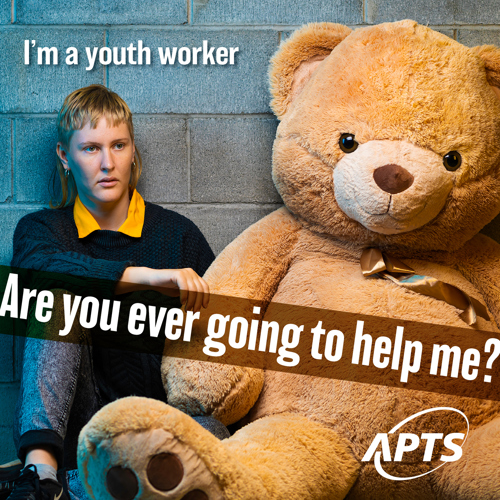Day of action for youth centres | Youth workers cry out for support: “Are you ever going to help me?”
December 8, 2022

Montréal – At a press briefing shortly before a symbolic action in front of the Centre de réadaptation pour les jeunes en difficulté d'adaptation Dominique-Savio, union spokespersons for the Alliance du personnel professionnel et technique de la santé et des services sociaux (APTS) decried the mounting workload that their members in youth protection and youth centres are struggling to shoulder.
“A year and a half after the Laurent Commission tabled its report, conditions in youth centres still haven’t changed. Waiting lists are getting longer. There are endless delays, and conditions are extremely difficult in the various work settings. Our members are running on empty. This excessive workload is undermining their ability to provide essential services. No one is more concerned about young people’s quality of life than workers in youth centres. Standards of practice that lead to real improvements in the workplace have to be introduced promptly,” declared Robert Comeau, President of the APTS.
Ever since the Laurent Report was tabled, the APTS has been hounding the government to implement the commissioners’ recommendations. Unfortunately, the union didn’t paint a very pretty picture of the situation across the province.
“Our youth workers are exhausted and they live with the fear that a casefile will slip through the cracks or that they won’t have enough time to do the necessary follow-up. Any slip-up could have a serious impact on a child’s life. What they need is a workload that is defined based on their professional autonomy and on qualitative indicators that take into consideration the young person’s needs and the path that has to be taken to help them. All those factors need to be assessed based on youth workers’ professional judgement and experience, and affect their workload. Youth workers want what’s best for young people, and want to be able to serve them to the best of their ability, with a workload that enables them to meet their objectives in a 35-hour work week,” explained Steve Garceau, APTS provincial representative for Lanaudière, who worked in youth centres for over a decade as a specialized educator.
The situation in Montréal is critical
Montréal has been hit particularly hard by the labour shortage, and the number of reported situations involving youth protection has skyrocketed since the outbreak of the pandemic. The situation is critical for teams of youth workers. A recent survey in youth centres associated with the CIUSSS du Centre-Sud-de-l’Île-de-Montréal revealed that 78% of youth workers weren’t able to take their authorized breaks; 61% had to work during their personal time in order to meet the needs of the young people in their care; and half (49%) reported that they weren’t sleeping well, were crying more often, or felt sick before reporting to work.
“For years now, our members have been doubling and tripling their efforts to keep youth services afloat, but they are exhausted. This excessive workload can’t be allowed to go on any longer! Data from Québec’s health and social services ministry shows that it takes an average of 78 days to have a child’s case assessed in Montreal. Twice as long as the average across the province! That’s why we’re out on the street today. We’re going to bring our symbolic workload to our managers. It symbolizes the weight that our members are carrying on their shoulders. They’re the ones protecting our young people, and they are buckling under a crushing workload. They’re tearing themselves apart trying to do everything they have to do to offer services that are absolutely critical,” declared Caroline Letarte-Simoneau, APTS provincial representative for workers at the CIUSSS du Centre-Sud-de-l’Île-de-Montréal.
For the APTS, the government needs to take urgent action to tackle the labour shortage, in addition to setting specific criteria to lighten its members’ workload.
“Whatever standards of practice are set, if concrete steps aren’t taken soon to help attract and retain youth workers, the problem will only get worse over time. Announcing good intentions is not enough. Measures that are applicable in practice have to be rolled out quickly on the ground,” concluded Robert Comeau.
The APTS
The APTS (Alliance du personnel professionnel et technique de la santé et des services sociaux) represents more than 65,000 members who play a key role in ensuring that health and social services institutions run smoothly. Our members provide a wide range of services for the population as a whole, including diagnostic, rehabilitation, nutrition, psychosocial intervention, clinical support, and prevention services.

